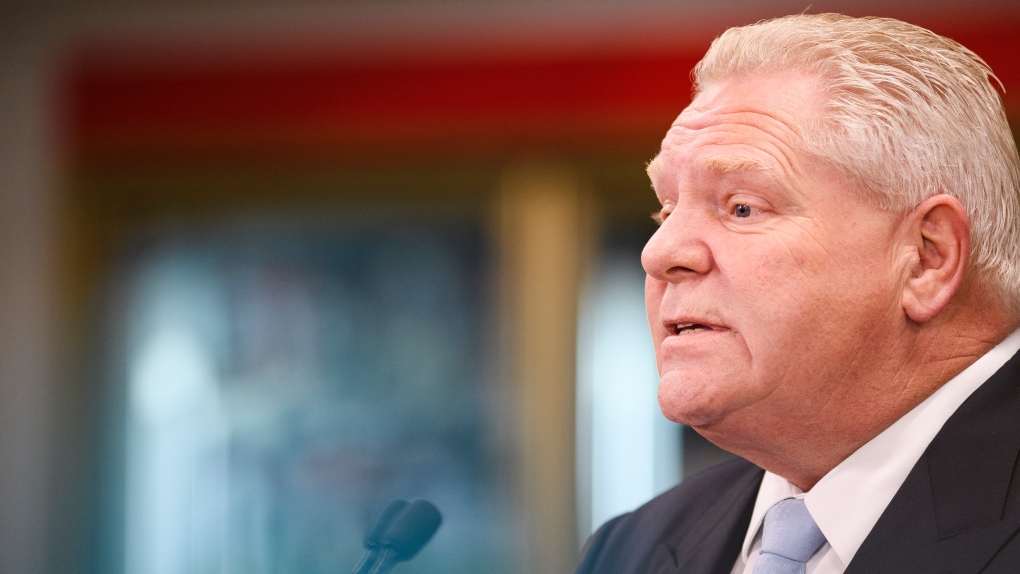Doug Ford Slams Trump’s Proposed 25% Tariff on Canadian Goods: “Like a Family Member Stabbing You"

Ontario Premier Doug Ford has fiercely criticized U.S. President-elect Donald Trump’s proposal to impose a 25% tariff on Canadian imports, describing it as “the biggest threat” from their closest ally. Ford likened the threat to “a family member stabbing you right in the heart,” underscoring his strong disapproval of the decision. Trump's proposed tariffs would affect all goods imported from Canada and Mexico, aiming to force both countries to curb the flow of illegal migrants and drugs into the U.S.
In a statement posted on his social media platform, Truth Social, Trump announced that the tariffs would remain in place until Canada and Mexico take significant action to prevent illegal immigration and drug trafficking into the United States. In response, Ford expressed his shock and disappointment during a press conference. He pointed out that Ontario alone conducts about $500 billion in trade with the U.S. every year and argued that the tariff proposal could severely disrupt Canada’s economy.
“I found his comments unfair, I found them insulting,” Ford remarked, describing the potential tariffs as an unnecessary strain on relations between the two countries. “Canada is no Mexico,” he emphasized, differentiating Canada’s situation from that of Mexico, which has historically been the target of U.S. tariffs. Ford’s remarks came as Canadian officials, including Prime Minister Justin Trudeau, were quick to react to the announcement. Trudeau spoke to Trump directly following the news, later describing their conversation as "good," though the contents of the call remain undisclosed.
The tariff threat has sent shockwaves through Canada’s business community, with industry leaders expressing deep concern over its potential impact. Dan Kelly, president of the Canadian Federation of Independent Business (CFIB), warned that even a 10% tariff would cause significant economic damage. The CFIB called on both federal and provincial governments to ensure that Canada remains a trustworthy trading partner to the U.S. and the broader global market.
In light of the tariff threat, Ford called for an urgent meeting of Canadian premiers with Prime Minister Trudeau to discuss a coordinated response. While he hopes a trade war can be avoided, Ford made it clear that Canada would have to retaliate if the tariffs were implemented. "We have to retaliate, not against the Americans, but the administration that made the wrong call,” Ford stated, emphasizing the need for a united front.
Ford also highlighted the deep interconnections between the Canadian and U.S. economies, particularly in industries like energy and critical minerals. Canada is the largest export market for 17 U.S. states, and a trade war could disrupt these vital trade flows. Furthermore, Ford pointed out that the U.S. often overlooks similar issues on its side of the border, such as the illegal movement of guns and drugs into Canada, which also poses a serious threat to public safety. "There’s illegal guns, there’s illegal drugs, there’s illegals coming across our border, and those guns are being used in heinous crimes coming in from the U.S.," he argued.
The proposed tariffs have stirred widespread concern, particularly in sectors like the automotive industry, which relies heavily on cross-border supply chains. Businesses on both sides of the border fear the uncertainty that could arise if these tariffs go into effect, as they would increase costs and disrupt operations.
As Canada prepares for potential fallout from this escalating trade dispute, much of the attention is now on how the Canadian government will respond. Prime Minister Trudeau’s ability to keep the provinces united in opposition to the tariff threat will be critical to Canada’s ability to push back effectively. With Premier Ford vocally leading the charge, it’s clear that Canada is rallying to protect its economic interests.
The coming weeks will likely be crucial in shaping the future of Canada-U.S. trade relations, as both nations weigh the consequences of this proposed tariff and consider potential solutions. Canada’s government will be under increasing pressure to ensure that its trade relationship with the U.S. remains strong and that any retaliatory measures are carefully considered to avoid further harm to both economies.
